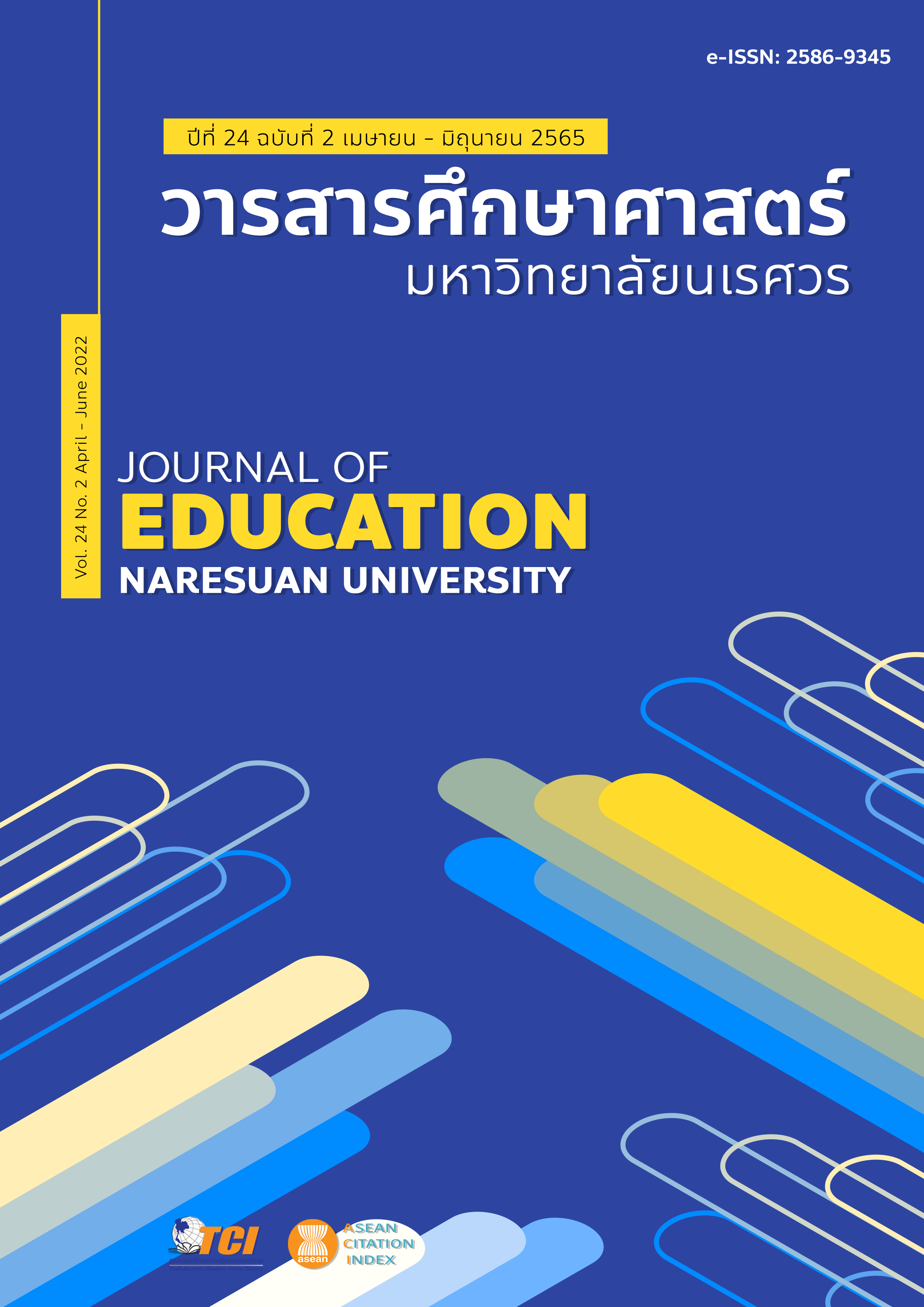THE EFFECTS OF INDUCTIVE LEARNING MANAGEMENT WITH COLLABORATIVE LEARNING THINK-PAIR-SHARE TECHNIQUE ON THE MATHEMATICAL REASONING AND WRITTEN COMMUNICATION ABILITIES OF MATHAYOMSUKSA 1 STUDENTS ผลการจัดการเรียนรู้แบบอุปนัยร่วมกับการเรียนรู้แบบร่วมมือเทคนิค THINK-PAIR-SHARE ที่มีต่อความสามารถในการให้เหตุผลและการสื่อสารด้านการเขียนทางคณิตศาสตร์ของนักเรียนชั้นมัธยมศึกษาปีที่ 1
Main Article Content
Abstract
The purposes of this research were to compare the student’s mathematical reasoning ability and mathematical written communication ability of seventh grade students after using inductive learning management with collaborative learning think-pair-share technique with a criterion of 70 percent. The samples for this research consisted of 25 seventh grade students at Piboonbumpen Demonstration School, Burapha University, selected by using cluster random sampling. The instruments used in the study were, 14 lesson plans, mathematical reasoning and written communication abilities test. Which the reliability was 0.93. The statistics for data analysis were mean, percentage, standard deviation and t-test for one sample.
The findings were as follows:
1. The mathematical reasoning ability of students after learning with inductive learning management with collaborative learning think-pair-share technique was statistically significant higher than the 70 percent criterion at the .05 level.
2. The mathematical written communication ability of students after learning with inductive learning management with collaborative learning think-pair-share technique was statistically significant higher than the 70 percent criterion at the .05 level.
Article Details

This work is licensed under a Creative Commons Attribution-NonCommercial-NoDerivatives 4.0 International License.
The owner of the article does not copy or violate any of its copyright. If any copyright infringement occurs or prosecution, in any case, the Editorial Board is not involved in all the rights to the owner of the article to be performed.
References
Angganapattarakajorn, V. (2012). Complete equipment: Matters should be known for mathematics teachers on curriculum, Teaching and research. Bangkok: Charan Sanitwong Printing. [in Thai]
Chaithieng, A. (2017). Principles of teaching (revised version). Bangkok: Odeon Store. [in Thai]
Department of Academic Affairs. (2001). Basic education curriculum 2001. Bangkok: Express transportation organization of Thailand. [in Thai]
Eggen, P., & Kauchak, (2006). D. Strategies and models for teachers teaching content and thinking Skill. Boston: Pearson Education.
Institute for the Promotion of Teaching Science and Technology. (2004). Knowledge and skills of Thai youth for tomorrow's world. Bangkok: Seven printing. [in Thai]
Institute for the Promotion of Teaching Science and Technology. (2006). Learning for tomorrow's world. Bangkok: Seven Printing. [in Thai]
Institute for the Promotion of Teaching Science and Technology. (2008). Science knowledge and competencies for tomorrow's world. Bangkok: Seven Printing. [in Thai]
Institute for the Promotion of Teaching Science and Technology. (2009a). The study of international mathematics learning trends. Bangkok: Sahamit Printing and Publishing. [in Thai]
Institute for the Promotion of Teaching Science and Technology. (2009b). Learning quality of Thai students, synthetic evaluation of PISA 2006 and TIMSS 2007. Bangkok: Seven Printing. [in Thai]
Institute for the Promotion of Teaching Science and Technology. (2011). PISA 2009 result on reading, mathematics and science. Bangkok: Aroon Printing. [in Thai]
Institute for the Promotion of Teaching Science and Technology. (2012). Professional mathematics teacher, the path to success. Bangkok: 3-Q Media. [in Thai]
Institute for the Promotion of Teaching Science and Technology. (2013). Conclusions of TIMSS 2011 of Mathayomsuksa 2. Samut Prakan: Advance Printing Service. [in Thai]
Institute for the Promotion of Teaching Science and Technology. (2014). Evaluation result on reading, mathematics and science. Bangkok: Aroon Printing. [in Thai]
Institute for the Promotion of Teaching Science and Technology. (2017). Thai student Low “PISA” test because lack of analysis. http://www.bangkokbiznews.com/home/detail/politics/education/20120828/480762/เด็กไทยรั้งท้ายผลสอบPISA-นักวิชาการชี้ขาดคิดวิเคราะห์.html. [in Thai]
Karnjanalakpong, S. (2004). Educational innovation series 29 techniques for organizing learning activities: Cooperative learning. Bangkok: 21 Century. [in Thai]
Khemmani, T. (2002). Science of teaching - Knowledge for organizing effective learning processes. Bangkok: Chulalongkorn University Press. [in Thai]
Levin, R. (2008). Inside Jennifer’s 1st grade classroom: Think – Pair – Share. Retrieved from http://clte.asu.edu/active/usingtps.pdf
Lyman, F. (1981). The responsive classroom discussion: The inclusion of all students. Mainstreaming digest. University of Maryland, College Park, MD.
Makanong, A. (2010). Mathematical skills and processes. Bangkok: Chulalongkorn University Press. [in Thai]
Makanong, A. (2011). Mathematical skills and processes. Bangkok: Chulalongkorn University Press. [in Thai]
Malangtupthong, P. (2015). The effect of organizing inductive and deductive learning on Mathematical reasoning and written communication abilities in numbers theory of Mathayomsuksa IV students (Master thesis). Chon Buri: Burapha University. [in Thai]
Ministry of Education. (2008). Basic education core curriculum 2008. Bangkok: The agricultural cooperative federation of Thailand. [in Thai]
Moonkam, S., & Moonkam, A. (2002). 21 Learning management methods: To develop the thinking process. Bangkok: Photo Printing. [in Thai]
Naewdong, T. (2018). The effects of inductive learning management and think -pair - share technique on mathematical concept and reasoning ability of mathayomsuksa II students (Master thesis). Chon Buri: Burapha University. [in Thai]
National Council of Teachers of Mathematics. (1989). Curriculum and evaluation standards for schools mathematics. Virginia: The National Council of Teachers of Mathematics.
National Council of Teachers of Mathematics. (2000). Principles and standards for school mathematics. Virginia: National Council of Teacher of Mathematics.
Nofrilyan, A. P. F. (2011). The effectiveness of using Think-Pair-Share strategy in improving students writing narrative text at class XI social program of SMAN 1 Durenan (Master thesis). State Islamic College (STAIN) of Tulungagung.
Pongpan, P. (March 1, 2018). Interview. [in Thai]
Rowan, T. E., & Morrow, L. J. (1993). Implementing the K-8 curriculum and evaluation standards. Reading from the arithmetic teacher. Virginia: National Council of Teachers of Mathematics.
Tangsriseree, S. (2013). Effect of organizing mathematics learning activities using the guided discovery method and think-pair-share technique on the mathematical communication and connection abilities of eighth grade students (Master thesis). Bangkok: Chulalongkorn University. [in Thai]
Thurber, W. A. (1976). Teaching science in today’s secondary school. Boston: Allyn and Bacon.
Tipkong, S. (2001). Mathematics problem-solving. Bangkok: Council Printing House. [in Thai]


